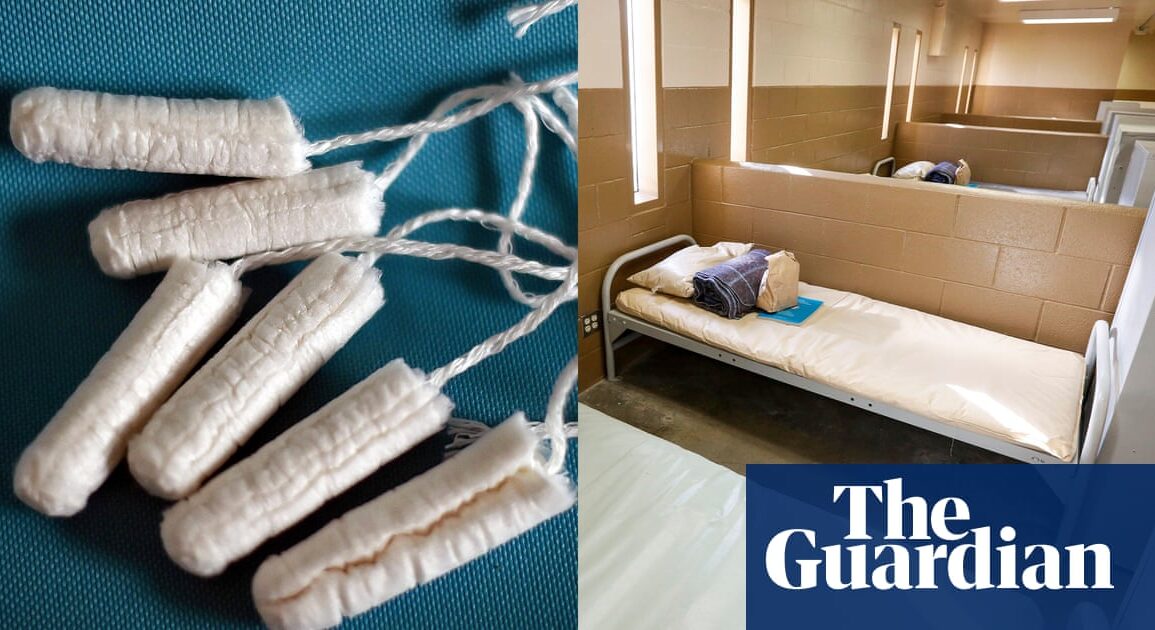
When Kimberly Haven struggled to acquire a tampon in prison, she made one, which she said led to her getting toxic shock syndrome and needing an emergency hysterectomy.
Haven’s case – emblematic of an issue thousands of incarcerated women still face today – underscores the pressing need for improved menstrual product access in facilities across the US.
States like California are addressing this issue with recent strides to improve prison menstrual equity. Bill AB 1810, which would no longer require women to request access to period products and would instead make them readily available, was recently passed from the legislature to the governor’s desk with no opposition votes.
Advocates nationwide argue, however, that there is still a long way to go and that these incidents speak to greater injustices that women in prison face every day.
“It is a much larger systemic issue of punishment, of neglect, of dehumanizing and belittling behaviors that our carceral systems inflict on the people that are in their custody,” Haven told the Guardian. “When I couldn’t provide for myself, I had to make do.”
When California advanced Bill AB 1810 to the governor’s desk for approval towards the end of August, it signaled a key advancement for prison period poverty in the state.
If passed, the bill will “remove a dangerous barrier for people who menstruate and allow them timely access to menstrual pads or tampons”.
The changes this bill proposes would apply to state, local and juvenile facilities and it emphasizes the need for women requesting these supplies to have access to them conveniently – without embarrassment or obstacles.
Assemblymember Isaac Bryan, the author of AB 1810, acknowledged that the previous need to request these products led to “dehumanizing and unsafe conditions where incarcerated people have been forced to fashion period products out of toilet paper or bed sheets and wear bloodstained clothes between laundry days”.
He went on to list reports of correctional officers leveraging access to period products to sexually assault, mistreat, harass or humiliate those in need and how policies previously exacerbated these harmful power imbalances.
“Access to menstrual products is not a luxury or a privilege, it is a necessity,” Bryan told the Guardian.
“AB 1810 ensures the right to menstrual care is protected for all women no matter where they are.”
While Haven was incarcerated, she claimed to know individuals in her facility who had to use their bedding or clothes because they didn’t have the appropriate period products. She also knew some who would turn down visits with their families due to lack of access to products.
A video of a Kentucky woman went viral in 2016 after she was bright into a Louisville court seemingly wearing no pants, having allegedly not been offered menstrual products for three days.
In 2019, Colorado state representative Leslie Herod gave a speech on the need for free and accessible period products in jails, which became house bill 1224. Tampons have been used to “barter, trade and sanction”, she said in her address. “Women were having to trade sex for access to tampons.”
While lawmakers nationwide have made some efforts in the last 10 years to improve legislative protections around menstrual equity for incarcerated people, there are still shortfalls in the system.
Senators Cory Booker and Elizabeth Warren introduced the Dignity for Incarcerated Women Act in 2017, mandating that federal prisons supply menstrual products.
This was followed by an announcement from the federal prison system, which declared it would provide these menstrual products free of charge. However, this only applies to those in federal jails and prisons, which make up a small percentage of the roughly 190,000 women who are currently incarcerated in various facilities across the US.
Miriam Vishniac, a PhD student in Social Policy at the University of Edinburgh, has been researching this area as part of her PhD. Vishniac has been looking at what access to menstrual products is like in women’s prisons through official documentation and interviewing formerly incarcerated menstruators and people who work closely with them professionally. The research she has compiled is publicly accessible on her website, the Prison Flow Project.
“Every single woman who had experienced a period in prison said it was horrible to have to actually ask for things,” Vishniac said.
“Unanimously, no matter where they were in prison, it made them feel like they were forced to beg like dogs for every single product.”
Vishniac noted that despite the new law, “California will still not have any internal department of correction rules or mention of the provision of products in their facility handbooks, so they are still one of the 30 states which only mention access in one category.
“There are only seven jurisdictions which have language implying that in official documents,” she said, drawing on her research.
“The federal government, Alabama, Georgia, Hawaii, Illinois, Maine, and Pennsylvania. This is a comparatively progressive approach and something more states should do.”
Haven, who has continued to advocate for menstrual equity in prisons since her release, has also said she “continues to remain vigilant”.
“I do what I do because there are things that I saw, things that I heard, things that happened to me, and things that I know were wrong,” Haven said.
“That’s been my entire career. When I first started, I had the moniker of tampon queen. The more I fight back, I’ve become tampon bitch.”
This post was originally published on this site be sure to check out more of their content.









